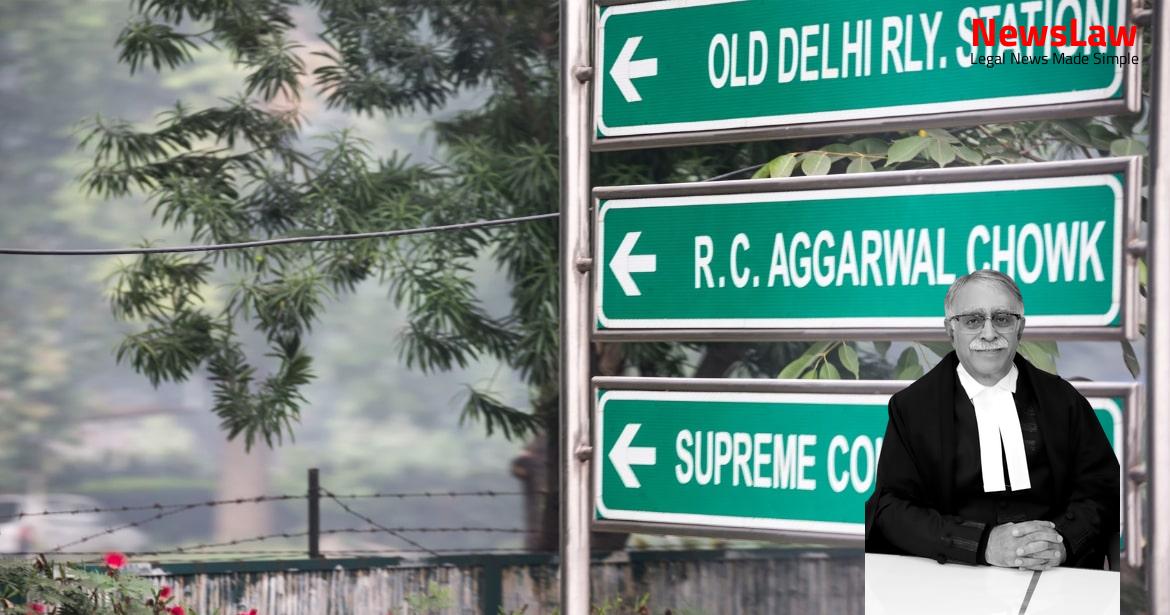The Supreme Court of India recently delivered a significant judgment in the case of Surendra vs. Sanjay regarding a dispute over a loan and potential benami transaction. The case delved into complex legalities surrounding the source of funds, contractual agreements, and the implications of the Benami Transactions (Prohibition) Act. This summary will explore the court’s findings and the key considerations that led to the final judgment.
Facts
- Surendra filed a suit against Sanjay and his proprietorship firm for the recovery of ₹1,08,000/- that was allegedly owed as a loan.
- Surendra appointed Sanjay as Power of Attorney and executed a General Power of Attorney deed in favor of Sanjay.
- Sanjay received an advance of ₹80,000/- from Surendra for business expansion.
- Sanjay issued three post-dated cheques to Surendra but requested not to present them for collection for a few months.
- Sanjay repeatedly asked for the return of the cheques, but Surendra insisted on keeping them as the elder relative.
- The trial court initially dismissed the suit, but the High Court decreed the recovery of ₹80,000/- in appeal against Sanjay.
- The High Court analyzed crucial documents such as cheques and receipts to determine if the loan amount was returned on the same day.
- Concerns were raised about why certain documents were not returned if the amount was indeed repaid.
- The court found that the plaintiff had sufficient funds to lend the amount in question to the defendant.
- The judgment set aside the earlier decision and directed the defendants to repay the loan amount with interest.
- The trial court’s view on the deposited amount creating doubt regarding the immediate repayment was highlighted.
- Two applications were filed during the appeal to amend the pleading and relief clause in the plaint.
- The High Court framed three points for consideration, focusing on the sale consideration, pleading requirements, and the need for amendment.
- Sanjay’s admission of signatures on key documents was considered significant by the court.
- The discrepancy in the sale consideration amount and the completion of the sale on a different date were noted by the High Court.
- The High Court found the defendants liable for costs throughout the proceedings.
Also Read: Legal Analysis of Claim for Loss of Profit in Delayed Contract
Arguments
- The plaintiff did not have any amount in his bank account as on 30.01.1990 or soon thereafter.
- The appellant’s counsel argued that the high court erred in appreciating the evidence and that the plaintiff introduced a new case during cross-examination not supported by the pleadings.
- The impugned judgment relied on inadmissible documents for findings, which was deemed as erroneous by Mr. Santosh Kumar.
- The court connected the receipt issued by Sanjay with the agreement, indicating a sale consideration of ₹2,30,000, which was conjectural.
- The plaintiff’s claim that the sale value of ₹2,30,000 compared to the declared value of ₹1,30,000 cannot be accepted due to it being a prohibited transaction against public policy.
- The original agreement was never presented as evidence in the record, undermining the plaintiff’s argument.
- Citing the Benami Transactions (Prohibition) Act, 1988, the appellant’s counsel contended that any plea involving benami transactions could not be entertained by the courts.
- The appellant admitted his signature on the agreement dated 3.7.1989 during cross-examination.
- The appellant agreed that the original document was with the buyer of the property.
- The agreement dated 3.7.1989 was executed for a sum of ₹2,30,000, establishing the plaintiff had funds to advance to Sanjay.
- The document was considered irrelevant once the extension of the loan to the appellant was admitted.
- The trial court based its dismissal on the belief that the amount in question was part of the sale consideration.
- The high court overlooked the fact that the sum of ₹80,000 was received by the plaintiff and deposited in the bank account the next day.
- Sanjay maintained that the cheques were issued to the plaintiff at the latter’s insistence and were not returned despite requests.
Also Read: Public Declaration Requirement in Marriage under Hindu Marriage Act
Analysis
- Surendra went to Indore at Sanjay’s request to conclude a transaction with the buyer, Niranjan Singh Nagra, and received the agreed amount.
- Sanjay received 50,000 from the buyer and gave it to Surendra.
- There was a photocopy document admitted by the defendant, despite being a photocopy, and the original was with the purchaser.
- Plaintiff did not claim a return of any amount from the buyer in the suit.
- The High Court considered the discrepancy in the sale consideration as per the agreement and the amount deposited in Surendra’s account.
- The plaintiff is not asserting any claim as a benami owner, nor arguing based on a benami transaction.
- The defendant/appellant’s argument that the real consideration for the sale being 2,30,000 entailed a benami transaction claim was deemed insubstantial.
- Benami transactions are defined as transactions where a property is held by one person for the immediate or future benefit of another person who provided the consideration for the property.
- No suit, claim, or action can be initiated by a person claiming to be the real owner of a benami property against the person in whose name the property is held or any other person.
- No defense based on any right in respect of a benami property can be used in a suit by a person claiming to be the real owner.
- Entering into benami transactions is punishable by imprisonment for up to three years, a fine, or both.
- Any benami transactions entered into after the commencement of the Benami Transactions (Prohibition) Amendment Act, 2016, will be punished according to the provisions in Chapter VII of the Act.
- It is prohibited for any person to enter into a benami transaction.
- The burden of proving that a particular sale is benami lies on the person alleging the transaction to be benami.
- Difficulties in proving a benami transaction do not relieve the asserting party of the onus of proof.
- Mere conjectures or surmises cannot substitute for proof in establishing a benami transaction.
- Intention of the parties involved is crucial in determining a benami transaction.
- Six circumstances can be taken as a guide to determine the nature of a transaction: source of purchase money, nature and possession of the property post-purchase, motive for the benami transaction, relationship between parties, custody of title deeds, and conduct of parties post-sale.
- The efficacy of the indicia varies based on the facts of each case.
- Source of purchase money and motive for the benami purchase are key tests in establishing a benami transaction.
- Intention of the parties and the source of money provided are essential in a benami transaction.
- Failure to trace the source of money to the asserting party and failure to examine relevant witnesses can weaken the case for a benami transaction.
- Courts finds conclusions and findings in the impugned judgment justified
- Appeal is dismissed due to lack of merit
- No costs awarded for the appeal
Also Read: OCI Cardholders’ Rights and Retroactive Notifications
Case Title: M/S FAIR COMMUNCIATION AND CONSULTANT. Vs. SURENDER KARDILE (2020 INSC 57)
Case Number: C.A. No.-000106-000106 / 2010



